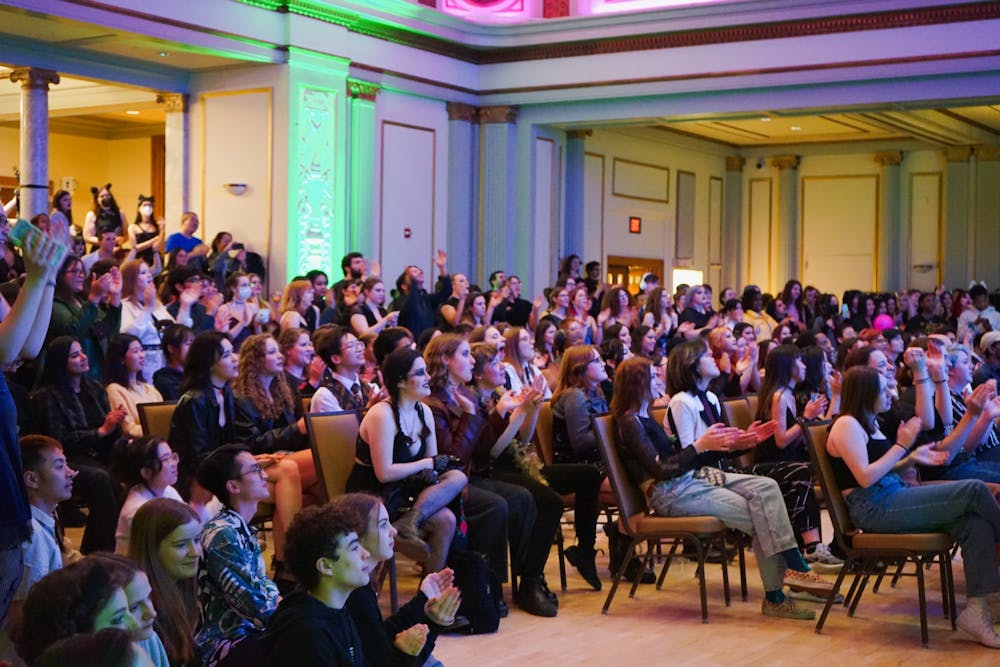In late October 1969, a card was pinned on the bulletin board at Memorial Union announcing the first open meeting of homosexuals in Wisconsin.
The meeting was set to take place in the undercroft of St. Francis House, an Episcopal church located on campus.
“The first time I went there, I had to circle around the building three times before I could get up the nerve to go in,” said Jim Yeadon, an early member of the group, according to OurLives, a Wisconsin LGBTQ+ news organization.
Out of fear, most members were reluctant to share their names.
More than 50 years later, a tattered and weathered pride flag hangs out of the second-floor window of St. Francis House on University Avenue. It’s meant to remind passersby of the powerful history and community LGBTQ+ individuals continue to forge on the University of Wisconsin-Madison campus.
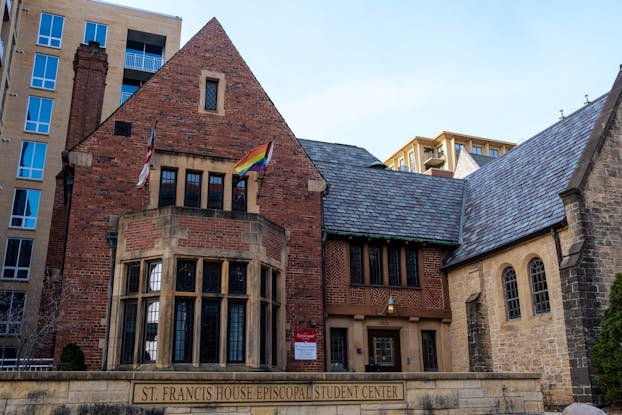
The state of Wisconsin is home to over 258,400 individuals ages 13 and over who identify as lesbian, gay, bisexual, transgender, queer/questioning, intersex, asexual/aromantic or other non-straight, non-cisgender identities, according to 2023 data from the Williams Institute at the University of California-Los Angeles.
LGBTQ+ people are particularly visible among younger generations. A nationally representative Gallup survey in March estimated more than 1 in 5 Gen Z adults identify as LGBTQ+.
Despite political and cultural battles over LGBTQ+ rights in Wisconsin — including ongoing debates around diversity, equity and inclusion at UW campuses — multiple LGBTQ+ students said Madison’s campus and city environment helped them find community.
“I feel like I’ve become more comfortable in my own skin,” said Charlie Huebner, a UW-Madison freshman. “I have opportunities to understand myself more now that I’m here.”
Students from rural areas say campus helps them find acceptance
Kaelyn Makela, a UW-Madison sophomore from a village in southeastern Wisconsin, said growing up queer in her hometown’s deeply conservative political demographic was challenging. “It was just the fear of knowing that you’re in a place where you weren’t surrounded by people with a similar mindset,” she said.
Huebner, a UW-Madison freshman from a small town 30 minutes east of Nashville, Tennessee, had a similar experience. Being a queer person in the South was stigmatized, she said.
“It was a bit of a scary situation. You weren’t sure if it would be safe to come out,” Huebner said. She said slurs, homophobia and transphobia weren’t uncommon.
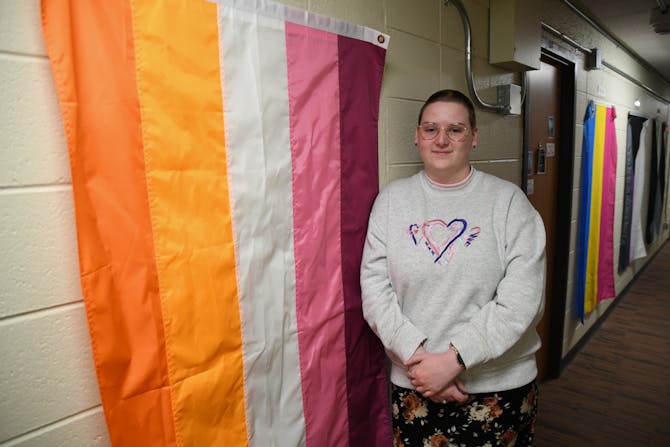
When Huebner came to Madison, she had culture shock. She was surprised to see Pride flags in churches — “Something you’d never see where I’m from” — and the acceptance of neopronouns, or pronouns beyond she/her, he/him or they/them, which she said “aren’t a thing” in her hometown.
“[At home] if you’re trans, you’re going to get what you get, if you can even be accepted as changing from she/her to he/him,” Huebner said. “I’m really accepted everywhere here.”
Huebner isn’t alone in feeling unaccepted in her hometown. In a 2022 national survey conducted by LGBTQ+ advocacy group the Trevor Project, researchers found only 37% of LGBTQ+ youth identified home as a safe space.
Makela also felt constrained by which identities were accepted and accepted in her hometown. Where she’s from “stunted” her from thinking she was gay, she said.
“I genuinely believed I was straight until I was a senior in high school, which is ridiculous. I was almost 18,” Makela said. “I told myself, ‘I’m not gay,' and even if I was, I would never come out of the closet.”
Living in Madison allowed Makela to be in her first relationship, something she said helped her accept her identity and freely express herself. “Being in Madison made being gay not a second thought that sat in the back of my mind, but rather part of who I am.”
Representation, spaces for LGBTQ+ community.
Chloe Foor, a UW-Madison senior, said increased visibility of accepted LGBTQ+ community members is important for LGBTQ+ individuals coming to Madison from rural and conservative areas.
“Being aware that there are other people like them who are living full and happy lives while still identifying as LGBTQ+ is very important,” Foor said.
Representation was important for Zainab Manzoor, a 2021 graduate of UW-Madison, who said she found comfort when surrounded by people similar to her.
“On campus itself, I was finally in a place where I had friends that identified as LGBTQ+,” Manzoor said. “It was very inviting, and it helped me realize that these feelings are natural.”
Foor is a student historian at the UW Archives conducting a year-long study on past, present and future spaces relevant to the “history and proliferation” of on-campus queer culture.
While covering the topic, Foor knew she would have to cover both the positive and negative experiences LGBTQ+ individuals faced. One critical instance was in the 1960s “gay purges,” in which UW-Madison searched for homosexual male students and attempted to force their exit from the university through expulsion, revocation of financial aid or arrest.
UW-Madison offered readmission in select cases — if students underwent psychotherapy or religious conversion therapy.
“In order for those spaces to be purged, they first had to be a place where gay people would meet and congregate,” Foor said.
Saint Francis House opened its doors to the first LGBTQ+ organization on campus and served as a “safe house” during the war protests and riots.
“The ethos around being a community meeting place was, 'Of course,’ so when the Madison Alliance for Homosexual Equality was looking for a meeting space, St. Francis House did not turn them away,” Foor wrote in a 2023 blog post.
Foor said the bathrooms of Science Hall were another LGBTQ+ space as well as Bascom Hall and the old campus library, now the Wisconsin Historical Society. Knowing that spaces exist, Foor said, can be a gateway into the community.
“The existence of a space is important to be aware of,” Foor said. “Without a physical location to meet and congregate, it's really hard to find a community.”
What are organizations doing to support students?
Many LGBTQ+ students said inclusive organizations and spaces are important for fostering their sense of belonging at UW-Madison.
“There are a lot of student organizations around campus that made it a promise to make the environment inclusive,” said Oscar, a UW-Madison freshman who asked to be identified only by his first name.
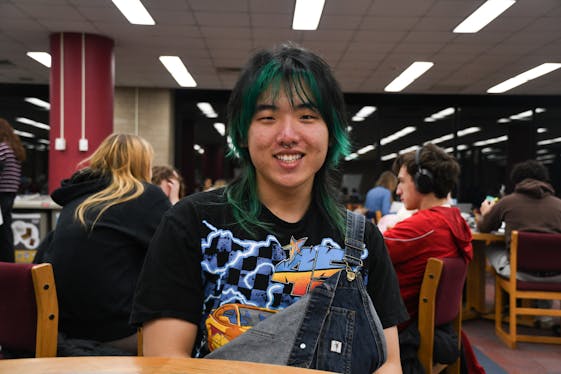
Coming to Madison allowed Huebner to express herself through one of those spaces, the UW-Madison Gender and Sexuality Campus Center (GSCC). It’s a resource Huebner values that never would’ve existed in her hometown, she said.
Located in the Red Gym, the GSCC provides education and outreach for UW-Madison LGBTQ+ students and allies. The center has an open physical space for students to study or relax in and hosts frequent events.
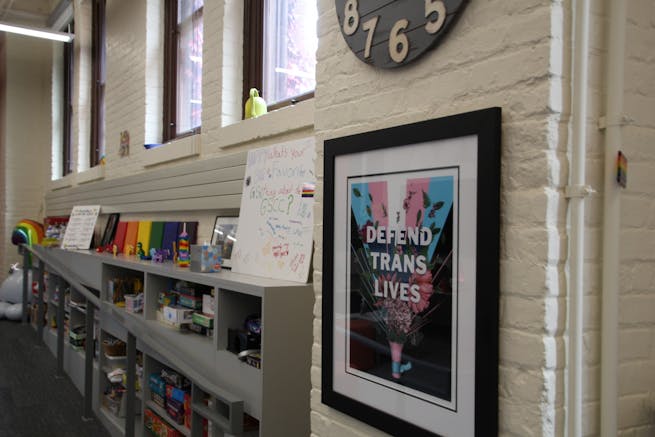
This year, more than 2,700 students subscribed to the GSCC newsletter, 600 attended its Wisconsin Welcome event in the fall and 320 are part of the group’s Discord channel, according to the GSCC website.
“We have events such as pool parties where you can wear whatever makes you comfortable, dogs on call events, queer karaoke. They're all aimed to make our community feel safe,” Huebner said.
Foor said dedicated spaces for LGBTQ+ people with other marginalized identities are especially important. Given issues with misogyny, racism and colorism within the larger LGBTQ+ community, she and others said LGBTQ+ people in other marginalized groups can feel out of place.

“It’s been a really big struggle, especially as someone who has grown up Chinese,” Oscar said. “Being a part of the LGBTQ+ community definitely makes it hard. A lot of the Chinese culture is very set in stone, and introducing a ‘new’ community is really hard for people to grasp and to support me.”
Manzoor, the 2021 UW graduate, said she had similar challenges balancing her racial, ethnic and religious identity with her LGBTQ+ identity. She said it can be hard for people to understand and not immediately stigmatize people who are LGBTQ+ within the Pakistani Muslim community.
“It can be very difficult to feel comfortable with your identity and feel included in some of those communities,” Manzoor said. “In certain religions and marginalized groups, it’s still taboo to identify as part of the LGBTQ+ community or identify with a different sexuality.”
For those at the intersection of LGBTQ+ identity and other marginalized identities, organizations like Queer and Trans People of Color provide “separate spaces where people can be themselves.”
Other individualized LGBTQ+ groups have targeted specific issues on campus or in the LGBTQ+ communities. A new group, Queer and Trans Engineers, attempts to make being an LGBTQ+ student in STEM a less difficult process to navigate.
Regarding the future of spaces for LGBTQ+ individuals on campus, Foor predicted there may be more support groups created within the LGBTQ+ community. Or, as people continue to become more accepting, she said current organizations could merge under one large group.
Foor said there’s still work ahead — work that will require a diversity of perspectives within the LGBTQ+ community.
“Always being willing to listen to LGBTQ+ voices is the most important thing for people to do,” Foor said. “Actively listen to the issues people are having, and then work actively to remedy those problems.”

